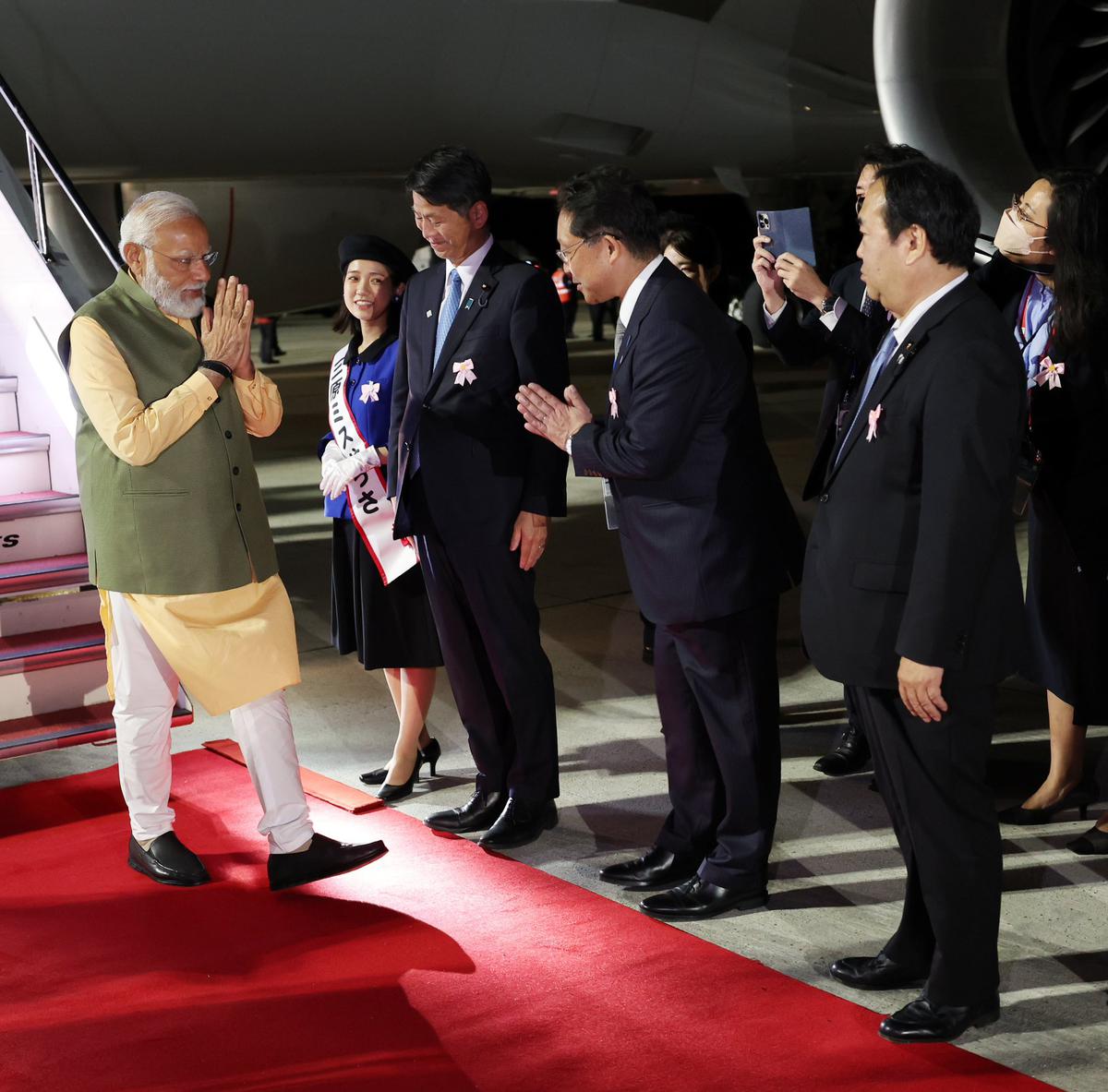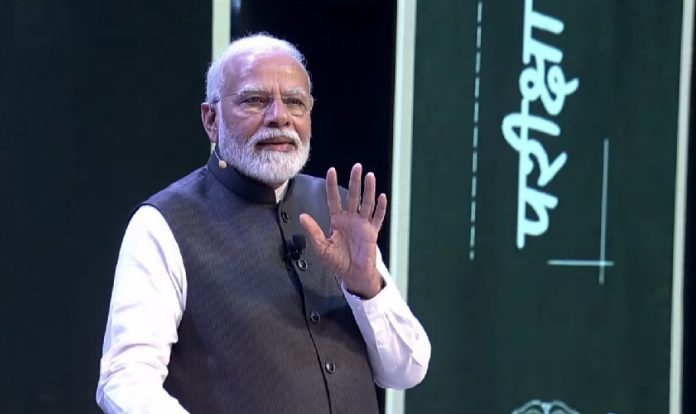Prime Minister Narendra Modi embarked on a transformative journey as he embarked on a six-day visit to three countries: Japan, Papua New Guinea, and Australia. From May 19 to 24, PM Modi’s itinerary was filled with significant meetings, engagements with the Indian diaspora, and moments of global admiration that left an indelible mark on the diplomatic landscape.
Upon his arrival in Papua New Guinea (PNG), Prime Minister Modi received a heartwarming gesture of respect from PNG Prime Minister James Marape, who touched his feet and sought his blessings. This historic encounter not only symbolized the warmth and reverence extended by the host country but also marked PM Modi’s first-ever visit to PNG, making it a milestone for bilateral relations between India and the Indo-Pacific nation.
Uniting Nations: PM Modi’s Diplomatic Triumphs and Cultural Exchanges
As the Indian diaspora in Papua New Guinea eagerly awaited PM Modi’s arrival, their enthusiasm manifested in a vibrant festival-like celebration in the capital city, Port Moresby. Overflowing with joy, members of the Indian community expressed their delight and gratitude for the Prime Minister’s visit. With cheerful voices, three young girls echoed their love for “Modiji” and warmly welcomed him to Papua New Guinea, epitomizing the strong bonds between the Indian diaspora and their homeland.
Throughout his visit, PM Modi engaged in a series of high-level meetings and discussions, reinforcing the importance of collaborative efforts and regional cooperation. A notable event was the gathering of leaders from the Forum for India-Pacific Islands Cooperation (FIPIC) in Port Moresby, where Prime Minister Modi posed alongside his counterparts. This assembly provided a platform to explore avenues of mutual growth and progress, amplifying India’s commitment to fostering strong ties with the Pacific Islands.
In a remarkable display of cultural appreciation, PM Modi launched a translation of the Tamil classic “Thirukkural” in the Tok Pisin language of Papua New Guinea. The presence of Papua New Guinea’s Prime Minister, James Marape, and other esteemed officials added significance to the occasion. This endeavor not only highlighted the rich literary heritage of India but also showcased the power of language as a bridge connecting diverse cultures.
Furthermore, Prime Minister Modi addressed a gathering of Pacific Island leaders, emphasizing the importance of collaboration and solidarity in addressing shared challenges. These discussions paved the way for enhanced cooperation and mutual understanding, fostering a sense of unity among nations in the Pacific region.
During his visit to Papua New Guinea, PM Modi engaged in bilateral talks with Governor General Bob Dadae at the historic Government House in Port Moresby. These discussions facilitated fruitful exchanges on matters of mutual interest, further strengthening the bonds between India and Papua New Guinea.
In addition to his engagements in Papua New Guinea, Prime Minister Modi also seized the opportunity to meet with counterparts from other nations, including Fiji and the Republic of Palau. These meetings, conducted on the sidelines of the Forum for India-Pacific Islands Cooperation (FIPIC) Summit, showcased India’s commitment to deepening ties with Pacific Island nations. PM Modi’s conversation with Prime Minister Sitiveni Rabuka of Fiji highlighted the enduring relationship between the two countries and their shared vision for future collaboration. Similarly, his meeting with President Surangel S. Whipps Jr. of the Republic of Palau underscored the importance of strengthening bilateral ties and exploring avenues for cooperation.
As PM Modi’s three-nation tour drew to a close, the impact of his visit reverberated across borders. His engagements, interactions, and moments of cultural exchange left an indelible impression on the diplomatic landscape, fostering stronger relationships and nurturing mutual understanding. By embracing the Indian diaspora, extending hands of friendship to global leaders, and promoting cultural exchange, Prime Minister Narendra
Pioneering Progress: PM Modi’s Commitment to Economic Growth and Technological Advancement
Modi exemplified the essence of diplomatic leadership and laid the foundation for a brighter future of collaboration, prosperity, and harmony among nations.
Beyond the diplomatic realm, Prime Minister Narendra Modi’s visit to Japan, Papua New Guinea, and Australia showcased his commitment to promoting economic cooperation, regional stability, and inclusive development. While diplomatic engagements formed a significant part of his agenda, PM Modi also took the opportunity to connect with the Indian diaspora, further strengthening their ties to their roots and fostering a sense of belonging and pride.
In Japan, the first stop of his tour, Prime Minister Modi attended the G7 Summit in Hiroshima, where he engaged in meaningful discussions with world leaders on critical global issues such as climate change, sustainable development, and economic recovery. His active participation and valuable insights underscored India’s commitment to collaborative efforts in shaping a better future for all.
During his visit to Papua New Guinea, PM Modi’s interactions with the Indian diaspora were filled with warmth and jubilation. The Indian community in PNG expressed their joy and gratitude for the Prime Minister’s visit, emphasizing the profound cultural and historical ties that bind them to India. The festival-like celebration that greeted PM Modi’s arrival not only showcased the vibrant Indian culture but also highlighted the diaspora’s contributions to the socio-economic fabric of Papua New Guinea.
In addition to engaging with the Indian diaspora, Prime Minister Modi’s meetings with Papua New Guinea’s leadership aimed to foster closer bilateral ties. The launch of the translation of the Tamil classic “Thirukkural” in the Tok Pisin language further promoted cultural exchange and mutual understanding between the two nations. This gesture resonated with the local population and exemplified India’s commitment to preserving its rich cultural heritage while embracing diversity.
The Prime Minister’s subsequent interactions with leaders from Pacific Island nations in Port Moresby marked a significant milestone in India’s engagement with the region. Through the Forum for India-Pacific Islands Cooperation (FIPIC), PM Modi emphasized the importance of shared values, collaboration, and sustainable development. These engagements facilitated dialogue on issues such as climate change, renewable energy, maritime security, and economic cooperation, paving the way for enhanced partnerships and mutually beneficial initiatives.
Furthermore, Prime Minister Modi’s meetings with leaders from Fiji and the Republic of Palau served to strengthen bilateral ties and explore avenues for deeper cooperation. The discussions focused on areas such as trade, investment, tourism, and people-to-people exchanges, highlighting India’s commitment to expanding its engagement with the Pacific Island nations and fostering a climate of mutual trust and friendship.
Throughout the tour, PM Modi’s interactions with world leaders showcased his visionary leadership and commitment to promoting global peace, stability, and prosperity. By engaging in meaningful dialogue and collaboration, he reaffirmed India’s role as a responsible global stakeholder and a proponent of multilateralism.
The visit also provided an opportunity for Prime Minister Narendra Modi to showcase India’s achievements, particularly in the areas of economic growth, technological advancement, and innovation. As one of the fastest-growing major economies in the world, India’s success story resonated with global leaders, further enhancing the country’s reputation as a reliable partner and an attractive investment destination.
As PM Modi’s tour concluded with his visit to Australia, the final stop on his itinerary, the bonds of friendship and cooperation between India and the Indo-Pacific nations were further solidified. The engagements focused on strengthening economic ties, promoting regional security, and advancing people-to-people connections. The Prime Minister’s presence at various events and meetings underscored India’s commitment to the Indo-Pacific region and its vision of a free, open, inclusive, and rules-based order.
In conclusion, Prime Minister Narendra Modi’s three-nation tour exemplified his leadership, strategic acumen, and commitment to fostering strong bilateral and multilateral relationships. Through diplomatic engagements, interactions with the Indian diaspora, and meaningful discussions with world leaders, PM Modi showcased India’s role as a responsible global player and a champion of shared progress
. The tour not only deepened bilateral ties but also laid the foundation for a more interconnected, prosperous, and peaceful future for the Indo-Pacific region and beyond.

